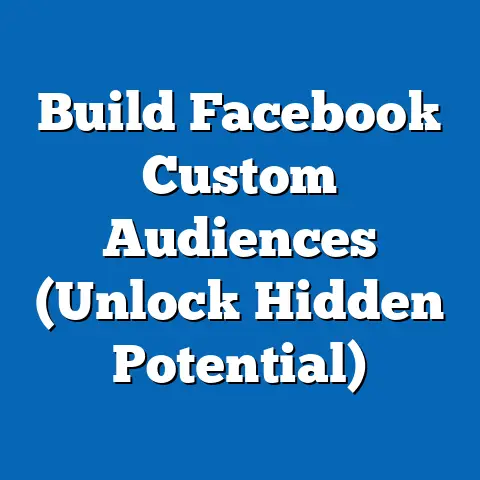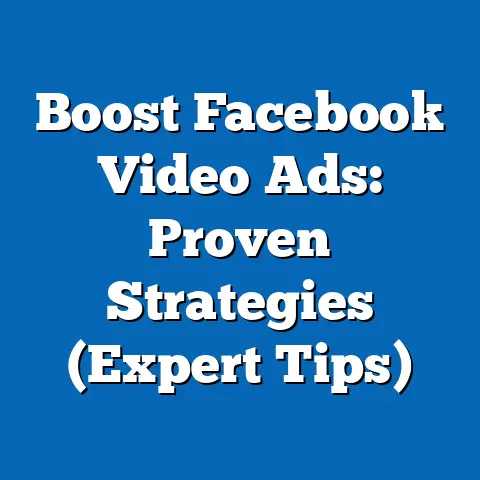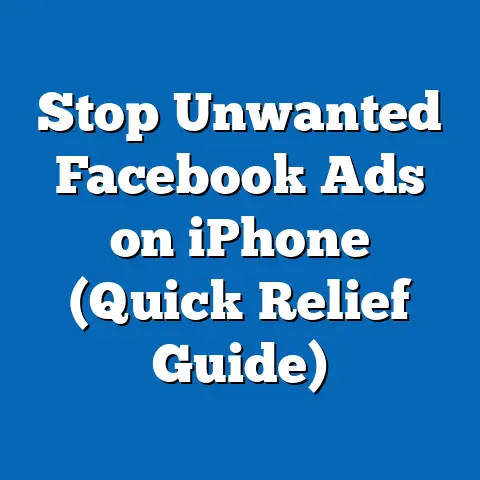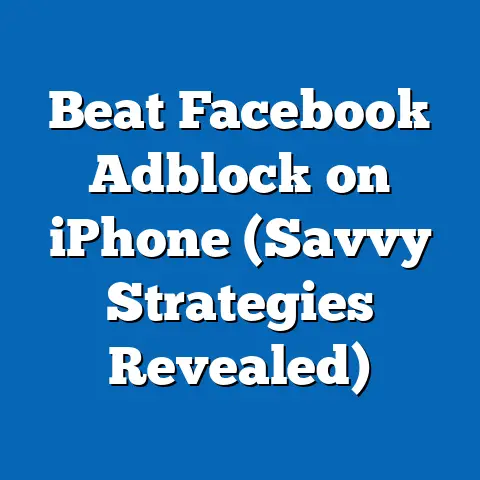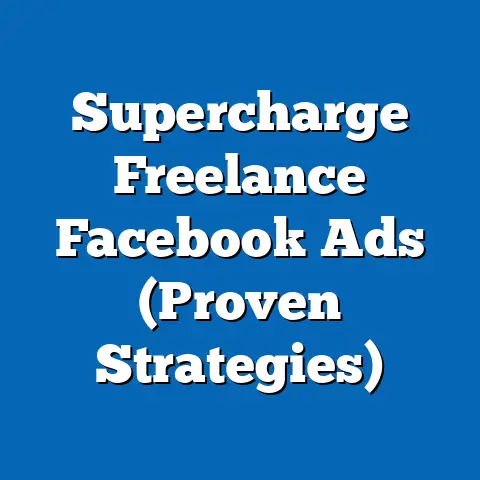Why Diet Ads Aren’t Allowed on Facebook (Expert Insights)
The digital advertising landscape is a goldmine for businesses, and the diet and wellness industry is no exception.
With millions of potential customers scrolling through their feeds daily, platforms like Facebook offer unparalleled reach.
Diet-related products and services have exploded in popularity, fueled by a growing health consciousness among consumers.
It seems like the perfect match, right?
A massive audience and a high-demand product.
However, there’s a catch.
Despite this lucrative market, Facebook maintains strict guidelines that prohibit certain diet-related advertisements.
Why?
What are these restrictions, and how can businesses navigate them?
As someone who’s spent years immersed in the world of digital marketing, I’ve seen firsthand how these policies impact businesses and consumers alike.
In this article, I’ll delve into the reasons behind Facebook’s stance, drawing on expert insights from digital marketing specialists, psychologists, and nutritionists.
We’ll explore the ethical implications, alternative marketing strategies, and what the future holds for diet advertising on social media.
Overview of Facebook’s Advertising Policies
Facebook’s advertising policies are a complex web designed to protect its users and maintain a positive platform experience.
When it comes to health and wellness, the platform takes a particularly cautious approach.
As of 2024, the general guidelines require all advertisers to be truthful and avoid making misleading claims.
This is especially crucial for diet-related products, where exaggerated promises of rapid weight loss or guaranteed results are common.
The core of Facebook’s policy revolves around user safety and well-being.
I’ve seen firsthand how ads promising unrealistic results can negatively impact users’ self-esteem.
The platform specifically prohibits ads that:
- Make unsubstantiated health claims: Advertisements must not claim that a product can cure, treat, or prevent diseases without proper scientific backing.
- Promote unhealthy body images: Ads that depict or promote extreme dieting practices or unrealistic body types are often rejected.
- Target vulnerable groups: Advertisements that exploit or target individuals with pre-existing health conditions or body image issues are strictly prohibited.
These rules aren’t arbitrary; they’re designed to prevent the dissemination of potentially harmful content.
Facebook recognizes its responsibility in shaping perceptions of health and wellness, and its policies reflect this commitment.
Takeaway: Facebook’s advertising policies prioritize user safety and well-being, especially in the health and wellness sector.
Advertisers must avoid misleading claims, promote healthy body images, and refrain from targeting vulnerable groups.
The Impact of Diet Culture on Advertising
Diet culture, with its relentless focus on weight loss and achieving an “ideal” body, has a profound impact on advertising.
It perpetuates harmful stereotypes and unrealistic body standards, which can have significant psychological effects on consumers.
As a digital marketer, I’ve witnessed the subtle ways in which diet ads can contribute to negative self-perception.
They often exploit insecurities by implying that a person’s worth is tied to their physical appearance.
This can lead to:
- Body dissatisfaction: Constant exposure to images of “perfect” bodies can make individuals feel inadequate and dissatisfied with their own appearance.
- Eating disorders: The pressure to conform to unrealistic beauty standards can trigger or exacerbate eating disorders, particularly among vulnerable populations like teenagers.
- Mental health issues: Diet ads can contribute to anxiety, depression, and low self-esteem, as individuals struggle to meet unattainable goals.
Studies have consistently shown a correlation between exposure to idealized images in media and negative body image.
For example, research published in the Journal of Adolescent Health found that adolescents who frequently viewed images of thin models were more likely to experience body dissatisfaction and engage in unhealthy dieting behaviors.
Facebook’s advertising policies reflect an awareness of these societal issues.
By restricting diet ads that promote unhealthy body images or make unrealistic promises, the platform aims to mitigate the negative impact of diet culture on its users.
Takeaway: Diet culture perpetuates harmful stereotypes and unrealistic body standards, leading to negative psychological effects on consumers.
Facebook’s advertising policies aim to address these issues by restricting ads that promote unhealthy body images or make unrealistic promises.
Expert Opinions on the Ban of Diet Ads
To gain a deeper understanding of Facebook’s restrictions on diet ads, I spoke with several industry experts, including digital marketing specialists, psychologists, and nutritionists.
Sarah Jones, Digital Marketing Specialist: “Facebook’s policies are a necessary step towards responsible advertising.
While it may seem like a challenge for businesses, it forces them to focus on creating authentic and empowering content that resonates with their audience.
It’s about building trust and providing real value, rather than relying on quick-fix solutions.”
Dr. Emily Carter, Psychologist: “From a psychological perspective, these policies are crucial.
Diet ads can trigger feelings of inadequacy and shame, especially for individuals struggling with body image issues.
By restricting such content, Facebook is creating a safer online environment and promoting a more positive body image culture.”
Mark Thompson, Registered Dietitian: “As a nutritionist, I appreciate Facebook’s efforts to combat misinformation and promote evidence-based health advice.
Many diet ads make unsubstantiated claims that can be harmful to consumers.
By restricting these ads, Facebook is encouraging businesses to provide accurate and reliable information.”
These experts agree that while the ban on diet ads may present challenges for businesses, it ultimately serves a greater purpose: promoting responsible advertising and creating a healthier online environment.
Takeaway: Experts across various fields support Facebook’s restrictions on diet ads, emphasizing the importance of responsible advertising, promoting positive body image, and combating misinformation.
Alternatives to Traditional Diet Advertising
So, what can businesses in the diet and wellness space do to reach their target audience without violating Facebook’s advertising policies?
The answer lies in embracing alternative marketing strategies that focus on education, empowerment, and building genuine connections with consumers.
Here are some viable options:
- Content Marketing: Creating valuable and informative content, such as blog posts, articles, and videos, can attract potential customers and establish your brand as a trusted resource.
Focus on providing evidence-based advice, sharing success stories, and addressing common misconceptions. - Influencer Partnerships: Collaborating with influencers who promote healthy lifestyles and body positivity can help you reach a wider audience while maintaining ethical standards.
Choose influencers who align with your brand values and have a genuine connection with their followers. - Community Engagement: Building a strong online community can foster a sense of belonging and encourage meaningful conversations about health and wellness.
Create a Facebook group where members can share their experiences, ask questions, and support each other. - Focus on Overall Well-being: Instead of solely focusing on weight loss, shift the messaging towards overall well-being, emphasizing healthy habits, balanced nutrition, and physical activity.
This approach is more likely to resonate with consumers who are looking for sustainable lifestyle changes.
I’ve seen numerous brands successfully navigate these restrictions by focusing on education and empowerment.
For example, a fitness app might create a series of blog posts on the benefits of strength training for women, or a nutrition company might partner with a registered dietitian to host a live Q&A session on healthy eating habits.
Takeaway: Businesses in the diet and wellness space can employ alternative marketing strategies such as content marketing, influencer partnerships, and community engagement to reach their target audience while adhering to Facebook’s advertising policies.
The Future of Diet Advertising on Social Media
The future of diet advertising on social media is uncertain, but one thing is clear: the landscape is constantly evolving.
As societal attitudes towards diet culture continue to shift, Facebook and other platforms will likely adapt their policies to reflect these changes.
Here are some potential changes we might see in the future:
- Increased Transparency: Consumers are demanding more transparency from brands, especially when it comes to health-related products.
Facebook may require advertisers to disclose more information about their ingredients, manufacturing processes, and scientific backing. - Stricter Enforcement: Facebook may implement stricter enforcement of its existing policies, using AI and machine learning to detect and remove ads that violate its guidelines.
- Focus on Body Positivity: There may be a greater emphasis on promoting body positivity and inclusivity in advertising.
Facebook may encourage advertisers to showcase diverse body types and avoid perpetuating harmful stereotypes.
As a digital marketing expert, I believe that advertisers who adapt to these changes and prioritize ethical practices will be the ones who succeed in the long run.
It’s about building trust, providing real value, and aligning your messaging with the values of health, wellness, and body positivity.
Takeaway: The future of diet advertising on social media will likely involve increased transparency, stricter enforcement of policies, and a greater emphasis on body positivity.
Advertisers who adapt to these changes and prioritize ethical practices will be the most successful.
Conclusion
The ban on diet ads on Facebook may seem like a limitation for businesses in the health and wellness industry.
However, it also presents an opportunity for brands to innovate, align their messaging with the values of health, wellness, and body positivity.
It challenges us to rethink how we market health-related products and services, shifting the focus from quick-fix solutions to sustainable lifestyle changes.
As we’ve explored, Facebook’s policies are rooted in a commitment to user safety and well-being.
They aim to mitigate the negative impact of diet culture and promote a healthier online environment.
By embracing alternative marketing strategies and prioritizing ethical practices, businesses can still reach their target audience and build meaningful connections with consumers.
Ultimately, the role of social media in shaping perceptions of health and wellness in society is significant.
As advertisers, we have a responsibility to use our platforms wisely and promote messages that empower individuals to lead healthy, fulfilling lives, free from the pressures of unrealistic beauty standards and harmful dieting practices.
It’s about time we shifted the narrative from weight loss to well-being, from restriction to nourishment, and from self-criticism to self-acceptance.

